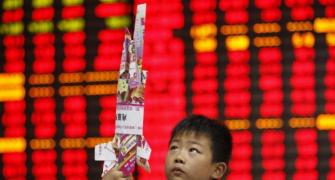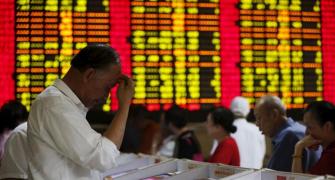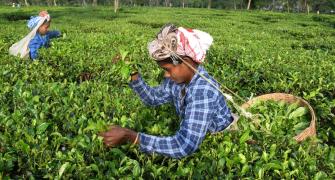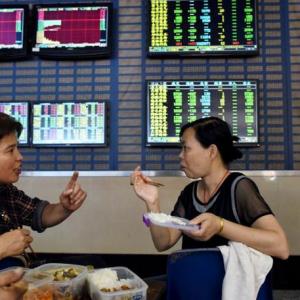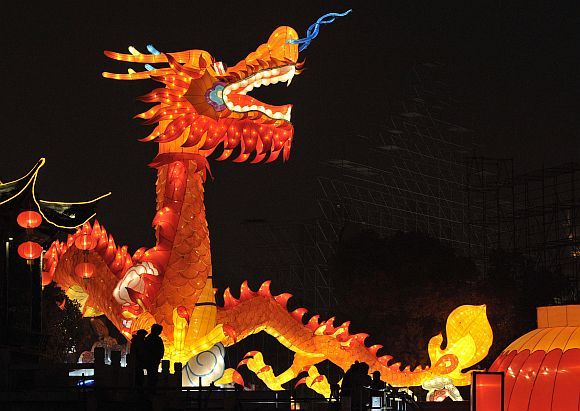
The price decline that has already occurred could trigger an ‘inverse wealth effect’, notes Devangshu Datta
At one time, it was said when America sneezed, the global economy caught flu. Nowadays that statement applies to China also.
The recent market crash there has triggered sympathetic drops across all the world's markets.
China is the second-largest economy in the world, with a 2014 gross domestic product of $10 trillion-plus, about five times as large as India.
The Public Republic of China's economy is around 60 per cent the size of the US ($17 trillion), but China makes a larger contribution to world trade because it is export-oriented.
China is the largest goods exporter in the world, importing raw materials and churning out finished goods, including highly sophisticated electronics and heavy machinery. It is an enormous importer of base metals and other commodities.
China is also the world's largest importer of gold, which is considered a store of wealth by the Chinese just as it is in India.
It is among the world's largest energy importers and it has a big footprint in terms of overseas projects.
It is building ports in Sri Lanka and Myanmar. It is mining across multiple locations in Africa. It has control of the largest forex reserves in the world.
The PRC itself has reserves amounting to $4 trillion, while Hong Kong, which is also controlled by China, has another $344 billion in reserves.
The Chinese have been internationalising the Renminbi, which is allowed to trade within a band against other currencies.
Despite the restrictions, the RMB is becoming more liquid and as and when capital controls are eased, it will become even more popular.
Fear of what a slow-down in China could do is understandable.
The Chinese have cut GDP estimates twice this year and their export growth has fallen.
Their best hope given a slow global economy is that rising domestic consumption will compensate.
A large proportion of China's market capitalisation -- close to 80 per cent -- is owned by retail investors.
A rising stock market creates a wealth effect for them.
Investors feel rich and spend more and thus, boost the economy.
A rising real estate market can also create a similar wealth effect.
Although Chinese households don't use credit all that much, it is possible to easily get personal loans against stock portfolios or real estate.
The last year saw a big bubble in Chinese stocks and real estate.
The major indices in Shanghai gained 130 per cent between June 2014 and June 2015.
The market hit all-time peaks in June with median PEs of 80-plus.
It is now down by 25 per cent from that peak.
There has been a recovery in the last two sessions, driven by a series of supportive measures.
But despite all the desperate efforts by the Chinese authorities to prop up the markets, prices at these levels might not be sustainable.
The median PE is still above 55 and it is understandable that investors will want to book paper profits, given the speed of decline.
The desire to book profits creates latent selling pressure.
The price decline that has already occurred could create an 'inverse wealth effect'.
If there is a further price decline, an inverse wealth effect would become more likely. Chinese consumers might pull back on spending if they suffer capital loss.
In that case, the Chinese economy might slow. If it does, the global demand for commodities will also slow.
Most metals are already trading low and so are energy fuels like crude, coal and natural gas.
This could have interesting effects on India. First, it is good for the external balance.
If crude and other energy prices are low, the current account is likely to remain under control, even if exports dip.
In general, government finances will be less stressed if crude and gas are low-priced. Inflation would also remain low in these circumstances and that is beneficial.
At the same time, India's mining and metals industry would suffer.
Exports would be under pressure due to low global demand. The investment cycle might also stutter because there will be less demand.
Also, there is every chance that China would cut prices in this scenario.
Then, cheaper imports might flood India and make domestic industry less competitive.
Balanced against that, if China is slowing down, there could be money flowing to India because India will be growing comparatively faster.
So valuations might not suffer and FDI inflows may actually rise.
So, another year or so of low global demand and low commodity prices might be what we're looking at, if the Chinese economy continues to decelerate.
The really dangerous situation would arise if the slowdown sets off political turmoil.
Let's hope that doesn't happen because the consequences of unrest could be very unpredictable.


